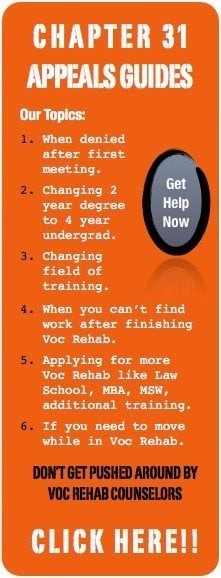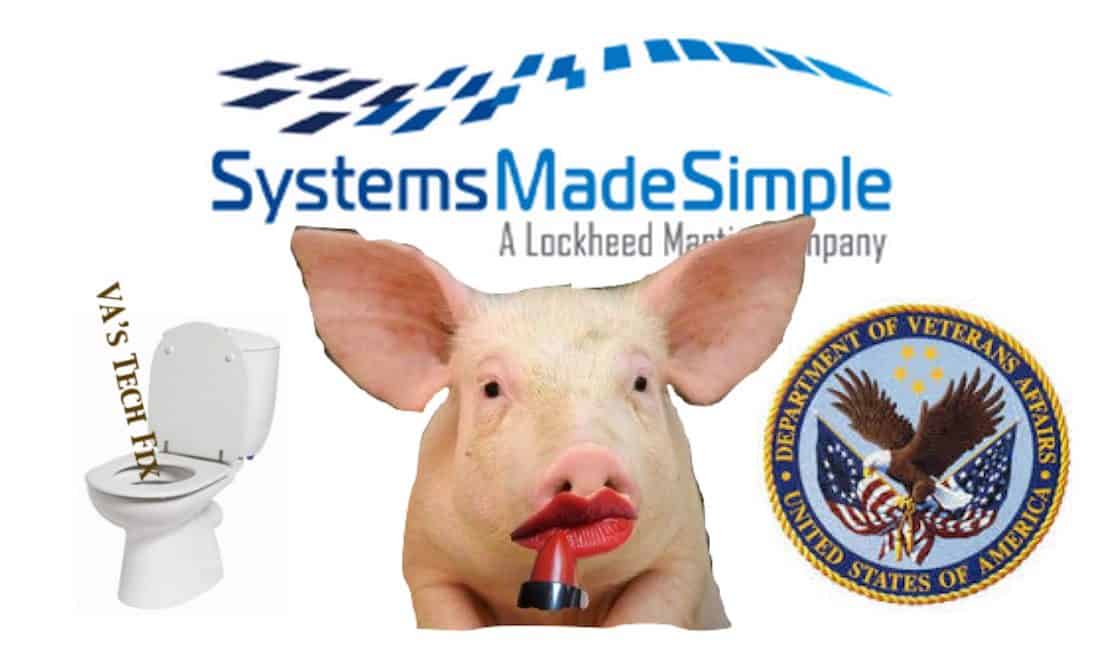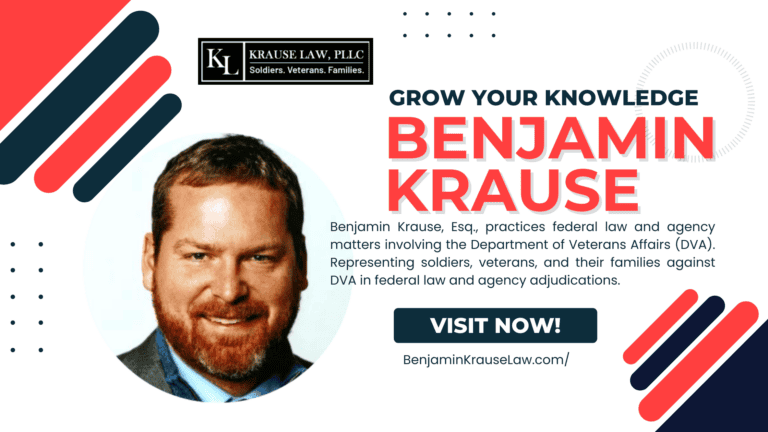Five Secrets to a Successful Vocational Rehabilitation Case

Vocational Rehabilitation is many things to many people. To some, it’s not worth the headache. For others, it’s a chance of a lifetime. The program is flawed, like many other programs within the Department of Veterans Affairs. There are many layers to the process that, if completed, can result in a win for any veteran.
Like a football, these layers must be pulled together in order to form your case. If you follow these in order, you will likely succeed in receiving the training you wish for the ideal job you want:
- Apply for the benefit
- Research the regulations
- Find appeals cases that are similar to your situation
- Search the internet for your ideal job – regardless of training requirements
- Put together your presentation
Now, we pull the seams together. The vast majority of veterans, who apply for Vocational Rehabilitation benefits, drop out of the program prior to developing an Individualized Written Rehabilitation Plan (IWRP). The largest reason for this is due to a lack of understanding relating to the purpose and rules of Chapter 31. To help with this issue, I thought it would be good to write a quick guide for veterans to use when they decide to apply for benefits through Chapter 31 Vocational Rehabilitation.

Pulling the seams tighter. If you’re applying for benefits, it’s important to do your research prior to your first meeting. Start by reading the regulations. These can be found online and are called the 38 CFR Part 21 and the VA’s own M28. Between these two sources, you will be able to understand the process more fully. Read over them and put your own situation into the context of those regulations. Your own case must make sense within the criteria of the regulations or it will get denied. Be real with yourself and with your counselor. If the regulations do not support your case, it is likely you will be denied.
Once you get through this portion, turn to the VA Appeals. Search for instances where the Board had to review a Voc Rehab case. Read what you can find and compare it to your own situation. This will allow you to see how the CFR applies to real veterans’ issues. Simply enter into the search “Chapter 31” and the relevant regulation to your case, say “21.50” since that’s the relevant regulation for someone seeking initial approval for entry into Chapter 31. Here is an approved appeals case where the person wanted training to become a dog trainer.
Then, after reading about what the program requirements are, do a little job market research of your own. A great website for this can be found on O*Net. Try to take a step back to see what type of career you may be aptly suited for. Then, do the research to see if you could realistically complete the training requirements. If you have a hard time reading, becoming a lawyer or doctor may not be likely. Now, if you struggle with reading because of a learning disability or cognitive disorder, that’s a very complicated set of issues to work through, but not impossible. Vocational Rehabilitation has a myriad of tests at the disposal of the professionals working within the department that can help distill the issues.
The more grandiose your training request, the more difficult it will be to gain approval. It is much easier to gain approval for an undergraduate degree in business than to gain approval to become a psychologist. If you get a denial, it does not mean you should stop pushing. On the other hand, it may mean you need to look for different ways to finance your training.
For law school, most universities will give their students around $50,000 per year in scholarships and student loans to cover tuition and living expenses. Similarly, the process of completing an MBA or PhD can be financed. PhD’s at the best schools are free along with some other graduate programs. Princeton has a great Master’s in Public Policy program that is free for qualified applicants. If your goal is to better yourself with further training to get that dream job, versus merely wanting more free benefits, there is always a way to make it happen. The only question is whether or not Vocational Rehabilitation will be your partner in the process. Good luck!




I bought the Voc Rehab Survival guide, followed the steps as outlined and filed my claim on feb 16, 20012. I had a meeting with the voc rehab person, and was notified today that :
“Mr. Gruben
Based on the conversation held with my supervisor, I have sufficient medical evidence to make an entitlement determination. You are entitled to Chapter 31 services. I will contact you today to discuss all recommendations presented by my supervisor. ”
Thanks for the guidance and good luck to all!
couselor seem to want to give me the run around being mean objective telling me if I need a labtop that would be out, sending me to be esscesed at Wyan State Vopp speaking objectively toward my goal to go to Kaplaln College for Cyber Security telling me that thing have changed that it not like it use to be like the GI Bill that chapter 31 is most part their decision and not mind gave me a pink letter stating if I do not agree with their decision appeal it why should I be denied my right to learn a higher education ,can someone help me with these staff member by law of Chapter 31 sevice connected Hep- C at 40%
I’m currently using Chap 33 benefits, but my 36 months will be up soon. How many months before the end of Chap 33, should I apply for Chap 31?
Get over $300,000 for college education.
I am wondering if this is true. VA chapter 31 Vocational Rehabilitation and Employment will pay up to $300,000 or more to retain veterans that qualify for additional benefits beyond 48 months. How do I know this is true? I used VA Vocal to get an undergrad degree.
I am willing to continue my education under the chapter 31. I have seen some veterans are successful in getting the benefits they deserve and some are not. In my researching and writing on the subject, there is a lot of misinformation arising.
My question here is: As a Total Disable (TDIU) 100%. Can I apply for benefits to returning to school?
Edward A. McDonald
[email protected]
Cell )210) 887-4046
Numerous veterans use the program for longer than 48 months. Read the regulations and some VA Appeals cases to verify the information yourself. It’s relatively straight forward. VA is able to do it. However, they do not have to do it. The outcome is centered around the abilities of the veteran in light of their disability. When you mean with the counselor for the first time, she will make a decision as to whether or not a particular goal is feasible.
As to the amount, do your own math. I graduated from Northwestern University for my undergrad and am currently enrolled at Lewis and Clark Law, both while using Chapter 31 Voc Rehab. Add the tuition, benefits and stipend together for 7 years. Basically, $35k tuition x 7 yrs + $670 x 82 months = $245k + $55k = $300k not counting books and other fees covered by the program. Someone getting an MD the same route would receive even more money. Someone attending a more expensive school would also receive more money. Hope this helps.
Ben,
So, it sounds like the best option is to seek approval based on trying to get accepted at a state school for the state in which I reside. I use my great MCAT score (I got a 36, which is the equivalent of a between a 168 and a 172 on the LSAT), to build a straight forward solution, in building my case for VR&E. Sound like a good start?
The reason I asked about Caribbean schools is that I have a lower GPA, stemming from low grades before I was pre-med. I applied this year, but only interviewed at one school, at which I am waitlisted currently. I am planning on reapplying for next year, and believe I will get in to a state school, but am just trying to cover all options.
Also try osteopathic schools. You have a better chance in getting in those schools. Western university in Pomona, Ca is awesome. My friend got in with a 2.7 gpa under grad is business and a post bac of 3.7 in 80 Qrt units for Bio and he also had a 32 mcat
So I’m rated 50% and about to finish my BS. I’ve just applied to VR&E in hopes that it will cover medical school, so I have 2 questions. Since I only have 3 months left on chapter 33 (after switching to chapter 33 once chapter 30 was maxed out), is it feasible to get an exception for chapter 31 to cover medical school. Second, if approved for medical school, but only accepted to a medical school in the Caribbean (fully accredited, accepting US federal financial aid, first two years in Caribbean and last two in US), would chapter 31 potentially cover that school (with a tuition of $195k)?
Thanks.
That will be very hard to get approved because of the out of state issue and moving between schools. In fact, I would encourage you to attend a stateside school for the duration of the training. Any Voc Rehab office will discourage you from attending a program out of state. They cannot approve something unless it is within their region. So, your long term request will not be an easy one to sort out. Beyond that, you have the additional issue of getting VA to extend your benefits beyond 48 months. That’s never easy. So, my advice, come up with a straight forward solution after you ace the MCAT. A low MCAT will be tough to push through.
Now all application for Voc Rehab need your physician to fill out the Voc Rehab form stating what? That you can’t work? Or that you have dx’s that make you what? I.e let’s say you just have hypertention…that would show what to the VocRehab? Or let us say you have TBI with emotional problem which makes you hard to manage while at work? I guess I am just needing to understand that physician form better. Thanks. I wish all the Vietnam Vets and prior had this.
i am a disabled vet who works for the gov. they have started harassing us vets and putting us off crews and belittling us. is there a way to gt help? i have went to eeo and our union with no luck. i need help, not just for me for several others. please contact me back if you know who can help.